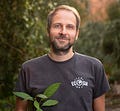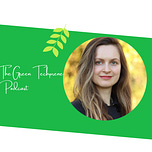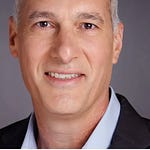What would you do, if you were struck by the messiness of poverty as a teenager travelling to a third world country for the first time?
For Ecosia Founder Christian Kroll the answer was to change the plans that he had for his life. At the age of just 16 he had started trading stocks and envisioned a future as a stock broker. But after travelling through India as an 18 year old, he decided his career would be more than a career – it would impact the planet.
After graduating from university, he spent one and a half years living in Nepal, India and South America searching for answers to the question that still haunted him….how would he impact the planet? “Living in South America, I realised how much we’re destroying our ecosystems. The rainforests are being cut down and replaced by soya plants or grazing fields...I really wanted to do something about it,” says Christian.
At university he had created a comparison website, and was earning money from commissions: “I realised how much money I was spending on online advertisement and that Google is a really good business model.
“I wanted to do something to help solve climate change and use my experience in tech. So I put those two things together. That’s how I created the search engine that plants trees.”
With 15 million users worldwide, Ecosia is the world’s largest not-for-profit search engine – it’s planted more than 128 million trees across 26 countries and powers its engine with 100% renewable energy. It may be one of the best-known cleantech companies of our time, but Christian’s initial attempts at building a non-for-profit search engine failed.
“I tried to find a few developers in Nepal and build a search engine with them to make money for social projects. The idea was pretty stupid because it was not possible to make money.
“On some days we had just four hours of electricity. I didn’t know how to start an online company and how to manage people. I didn’t understand the search market, my cash situation wasn’t great, every month I was losing money.”
Ecosia’s explosive growth came after many failed side-hustle projects, and was Christian’s third attempt at building a non-for-profit search engine. Here’s what he learnt on his rollercoaster journey to resounding success as a green techpreneur.
What made you stick with the idea of creating a non-for-profit search engine after your first attempts failed?
I looked at the opportunity cost, because I finished university with very good grades, faster than I needed to, and companies were interested in hiring me. I could have made a decent salary, but making money wasn’t so important to me. I wanted to give this a try, I believed in it, and then I just wanted to keep going.
At some point, my Mum said, you’ve been doing this for 1.5 years now, maybe it’s time that something works...I had a lot of freedom, but also realised that I can’t do this forever, at some point, something needs to work.
What did you do differently with Ecosia that led to its success?
We focused on the right audience and have a message that is compelling to everybody. Helping projects in Nepal may have been interesting to a few people, but helping solve climate change is interesting to everyone.
It was that, and tweaking the idea until it really worked. If you do something for the third time – you gain experience, you don’t make the same mistakes again. I had great support in building up the company, so it wasn't so dependent on myself.
Which growth and marketing strategies led to Ecosia’s explosive growth?
Ultimately, we built a product that really meets user needs. There are a lot of people who care about solving climate change, and Ecosia is one of the easiest things that you can do. We calculate that each search actually absorbs one kilogram of co2. If you do thousands of searches per year, that’s tons of co2 being removed – that's a significant part of your carbon footprint. And it takes 1-2 clicks to change your search engine. People understand that and recommend it to their friends – this is our most powerful growth channel.
We also use traditional marketing. We put advertisements on Facebook, YouTube. We try posters as well for out-of-home advertising.
A few of our campaigns were very successful. For example, we wanted to buy an ancient forest off of a coal company in Germany, and that generated a lot of attention and our user numbers went up. We wanted to send out a message that coal should stay in the ground.
These are things we can do as a non-for-profit company that are a bit different. It really builds trust and a great brand, and then, hopefully, people come to you.
If you could go back in time and build Ecosia again, what would you do differently?
I would call my friend Tim. Tim joined in 2013, four years after I started the company, he is an experienced business angel who has already built various successful companies. At first he was quite involved on an operational level, now he has more of an advisor role. During the early years, he really supported the building of the company.
I wish I had called him earlier, because in the early years we were doing quite a lot of circles instead of going in one direction.
I think if you bring somebody on board as a mentor who really has done what you want to do, this really saves a lot of time, and also intellectually it's just great to have someone you can learn from.
What advice would you give to other green techpreneurs who are just starting out?
Validate your product
Build something that a significant amount of people really want so that you get traction for your product. A lot of entrepreneurs have good ideas, but then people don’t really use it. So validate your product. I tried many, many things until I founded Ecosia, which did what I wanted and also what the users wanted.
Think twice about taking investors on board
Ecosia belongs to itself, it’s impossible to take profits out or sell the company – that is very important. We could not have done this if we had taken venture capital in the early days, people underestimate how much freedom they're giving up. Sometimes the trade off is needed, but not always.
I see a lot of companies that at some point fall apart, or the founders leave, because they basically lost ownership or control of the company or feel like it's not going in the right direction anymore.
“We don’t have shareholders in the classical sense, and that gives us the freedom to do the right thing.”
We had to finance everything with our own cash flow. That's a very important restriction for me, it granted us the freedom to not have to pay any investors or look at how we can do a big exit.
We found this model of what we call a purpose company. Shares can only be given to employees, they can never be sold. Even if Microsoft or Google put a billion dollars on the table – we would not be able to sell it – that’s legally binding. Protecting Ecosia like that is very important to me, it’s impossible to take profits out of the company. I earn a normal salary and that’s enough for me.
A lot of companies are purely focused on shareholder value maximisation, I don’t believe this will lead to a good future, what we’re creating is a counter model to that. I never wanted to be a billionaire, if someone gave me a billion Euros tomorrow, I would just plant more trees.
Can you describe your green techpreneur journey in three words?
Persistence, purpose, and people.
What are your plans for scaling further?
Helping people make carbon-friendly consumer choices
Ecosia is a search engine that uses profits for planting trees, and that’s great, but we also want to use the search engine to help people make carbon-friendly choices.
Let's say you want to travel from Berlin to Munich by plane, Ecosia would tell you, ‘hey, that’s not such a great idea’, why don’t you take a train and save a couple hundred kilograms of CO?’ There are things like shopping and travel where this value proposition could be useful. We can have a big impact on our users CO2 footprint. Again, it helps that we are not a profit maximizing company, because we can tell people, ‘don’t buy this.’
Impacting the tree-planting sector
Where we can have a big impact is on the tree planting sector. Tree planting is one of the biggest things we can do to solve climate change, forests are super, super important. The sector isn’t well developed at the moment – it isn’t very transparent.
We want to raise the bar for tree planting and give donors certainty that if they say put money into tree planting, it will really have an impact. We have 16 projects in over 15,000 locations and we are monitoring that with satellites, mobile apps and machine learning to ensure we have high quality. We make this portfolio available to external companies, so if somebody wants to do tree-planting, they can do it through us.
In coming decades, we need 1 trillion new trees, but currently we’re still losing billions of trees every year – we’re far from achieving that.
Do you have a life philosophy you follow?
I want to solve climate change, and that’s a really difficult nut to crack. I’ve been working on this for 12 years now, and especially in the first 10 years, I just didn’t understand why people don’t wake up. This is the biggest existential threat the world has ever faced. It can get depressing, but at some point I decided, I’m going to give it my best and still have fun and enjoy my life while doing it. Because, ultimately, this is a marathon.
……………to stay grounded, Christian meditates and cycles, “cycling is a nice way of getting started with the day, and ending the day. If you’re a founder of a startup, you need to take time to recharge.” His dream house would be built with clay and would bring nature indoors with “a lot of plants and maybe some vegetables growing inside it.”
There are a few spots left for sponsorships. If you'd like to advertise and support the newsletter, you can book here.
Newsletter Recommendation
Interested in making smart decisions, improving your learning ability, and growing your career? Musings & Perspectives is a newsletter on growth, productivity, and performance – written by a Business Operations Lead at Facebook & Instagram.
If you’d like to upskill yourself in business and life in just 10 minutes a week – join 1,000+ readers and subscribe to Musings & Perspectives.
Community Notices
Share your product, services, book, or announcement to the Green Techpreneur for only £30 per post. Must be a good fit for the climatetech and entrepreneur community.
👉🏼 Pratik Dattani, Managing Director at Economic Policy Group, helps cleantech companies in their journey from R&D to commercialisation, working closely with founders to build multi-million dollar revenue opportunities, and marketing and communications strategies. He has deep market understanding of, and has worked closely with governments and regulators in, the UK, India and East Africa.
Make a Connection
Whether you’d like to find a mentor, an employee, a job, a business partnership, or just meet someone new over a virtual coffee who’s just as passionate about building greentech businesses – hit the button below and I’ll post a shout out for you in the next newsletter.














How Ecosia became the world’s biggest non-for-profit search engine